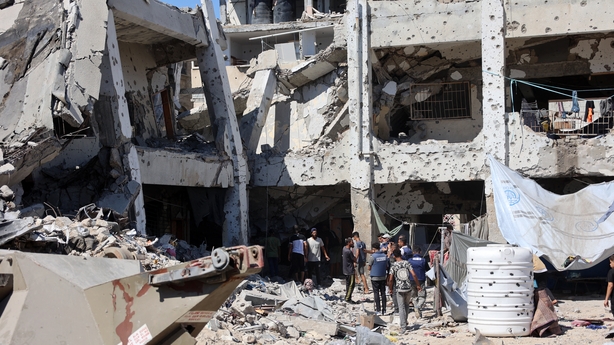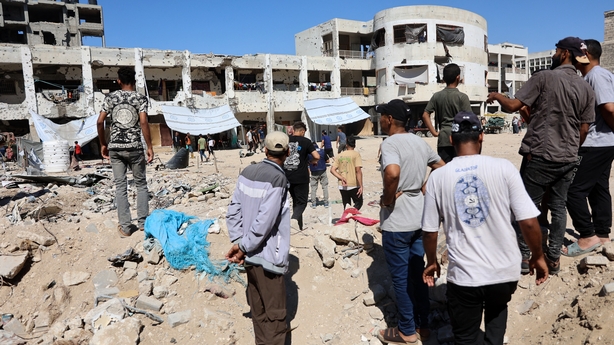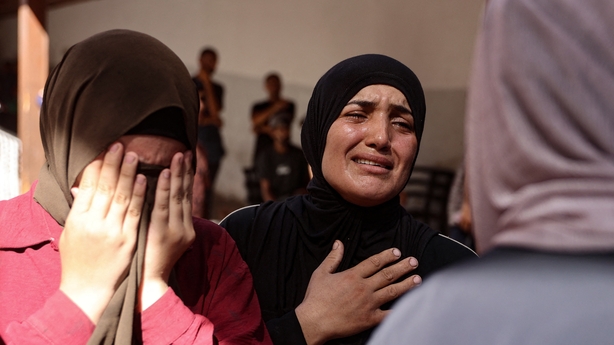Israeli Defence Minister Yoav Gallant said that Israel would fight Hezbollah "with all its might" if the Lebanese armed group continued its "aggression" across the border.
"We will not allow the Hezbollah militia to destabilise the border and the region. If Hezbollah continues its aggression, Israel will fight it, with all its might," Mr Gallant said in a message addressed to the people of Lebanon, according to a statement from his office.
Hezbollah has traded near-daily fire with Israeli forces in support of ally Hamas since the Palestinian militant group's 7 October attack on Israel triggered war in Gaza.
Fears of all-out war have mounted after Israel killed Hezbollah's top military commander Fuad Shukr in an air strike in a Beirut suburb last week.
Reminding the people of Lebanon of the 2006 war between Israel and Hezbollah, Mr Gallant warned Lebanon to "learn the lesson of the past so as not to fall into a dangerous scenario in August 2024".
The devastating 34-day war in July-August 2006 killed more than 1,200 people in Lebanon, mostly civilians, and some 160 Israelis, mostly soldiers.
Earlier, Israeli forces stepped up airstrikes across Gaza, killing at least 40 people, Palestinian medics said, in further battle with Hamas-led militants as Israel braced for potential wider war in the region.
Israeli airstrikes hit a cluster of houses in central Gaza's Al-Bureij camp, killing at least 15 people, and the nearby Al-Nuseirat camp, killing four, medics said.
Al-Nuseirat and Al-Bureij are among Gaza's eight historic camps and are seen by Israel as strongholds of armed militants.

Israeli aircraft also bombed a house in the heart of Gaza City in the north, killing five Palestinians, while another airstrike in the southern city of Khan Younis killed one person and wounded others, according to medics.
Later, 15 Palestinians were killed and 30 injured in Israeli bombings of two schools east of Gaza City, the territory's Civil Emergency Service said in a statement.
The Israeli military said it struck Hamas command and control centres embedded in the Abdel-Fattah Hamouda and Al-Zahra schools in the Tuffah neighbourhood of Gaza City, where Hamas militants were operating.
It accused Hamas of exploiting civilians and civilian properties for military purposes, an allegation Hamas denies.
"Prior to the strike, numerous steps were taken to mitigate the risk of harming civilians, including the use of precise munitions, surveillance, and additional intelligence," the military said.
"The school compounds were used by Hamas terrorists and commanders as command-and-control centres, from which they planned and carried out attacks against Israel Defence Forces troops and the state of Israel," it said.

The armed wings of Hamas and Islamic Jihad said they were firing anti-tank rockets and mortar bombs at Israeli forces operating across Gaza, causing deaths and injuries among them.
Israel's military said it had struck dozens of military targets across Gaza over the past 24 hours, including rocket launching pads.
Since the war in Gaza broke out on 7 October, the humanitarian situation in the besieged Palestinian territory remains dire, with almost all of its 2.4 million population displaced and suffering from food shortages.
The conflict began after Hamas militants attacked Israel on 7 October, resulting in the deaths of 1,198 people, mostly civilians, according to a tally based on official Israeli figures.
Militants also seized 251 people, 111 of whom are still held captive in Gaza, including 39 the Israeli military says are dead.
Israel's retaliatory military campaign in Gaza has killed at least 39,677 people, according to the health ministry in the Hamas-run territory, which does not provide details on civilian and militant deaths.

Israel seeks to 'expand tension, war' - Iran
Iran accused Israel of wanting to spread war in the Middle East, as diplomatic efforts sought a regional de-escalation following the killings of Tehran-allied militant leaders.
Ali Bagheri, Iran's acting foreign minister, said Israel had committed "a strategic mistake" by killing Hamas's political leader Ismail Haniyeh in Tehran last week - hours after the assassination in Beirut of Hezbollah's military chief.
Although Israel has not admitted to killing Haniyeh, Iran and its allies have vowed to retaliate, setting the region on edge as the Gaza war raged on into its 11th month.
Israel seeks "to expand tension, war and conflict to other countries", but has neither "the capacity nor the strength" to fight Iran, Mr Bagheri said.
Israeli Prime Minister Benjamin Netanyahu, speaking at a military base yesterday, said Israel was "prepared both defensively and offensively" and "determined" to defend itself.
Houthis vow to coordinate response to Israeli attacks
Meanwhile, the leader of Yemen's Houthis Abdul Malik al-Houthi said the group will coordinate with other members of the 'Axis of Resistance' in any joint operation against Israel.
He said any decision to respond to Israeli attacks would be made by the axis as a whole.
This comes as US military forces struck targets in Houthi-controlled Yemen in the past 24 hours.
US Central Command said it destroyed two drones, a Houthi ground control station, and three anti-ship cruise missiles.
Houthi military spokesperson Yahya Saree said earlier that the Houthi air force had launched drones against the US destroyer Cole and fired a number of ballistic missiles at the US destroyer Laboon yesterday.
The Houthi militants have carried out repeated drone and missile strikes on ships in the crucial shipping channels of the Red Sea, the Bab al-Mandab Strait and the Gulf of Aden since November to show their support for Palestinians in the Gaza war.
Elsewhere, Norway said it had summoned an Israeli embassy official to protest Israel's decision to revoke the diplomatic status of Norwegian envoys to the Palestinian Authority.
Cyprus on standby to evacuate foreign nationals
Cyprus is on standby to assist in the evacuation of Europeans and third-country nationals if conflict in the Middle East deepens, officials said.
"We are ready, we have activated a specific plan, ESTIA, which has been tried and tested," Cyprus' deputy government spokesperson Yiannis Antoniou said.
"In the event we are asked to assist other countries who may be moving their nationals from the crisis area home, we are in a position to host them for a few days until they are repatriated," he said.

